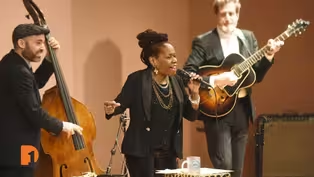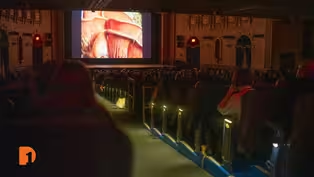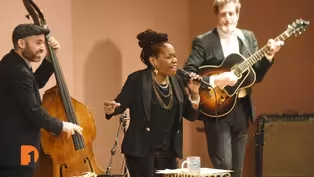
Detroit’s new police chief discusses the city’s community violence intervention
Clip: Season 9 Episode 38 | 7m 15sVideo has Closed Captions
Detroit Police Chief Todd Bettison talks about the city’s community violence intervention program.
A recent report shows that Detroit saw a 37-83% reduction in violent crimes from August to October 2024 in six major areas across the city. The findings are part of the city’s Community Violence Intervention program, which partners with organizations to reduce murders and shootings in the city. One Detroit contributor Nolan Finley talks to Detroit Police Chief Todd Bettison about the program.
Problems playing video? | Closed Captioning Feedback
Problems playing video? | Closed Captioning Feedback
One Detroit is a local public television program presented by Detroit PBS

Detroit’s new police chief discusses the city’s community violence intervention
Clip: Season 9 Episode 38 | 7m 15sVideo has Closed Captions
A recent report shows that Detroit saw a 37-83% reduction in violent crimes from August to October 2024 in six major areas across the city. The findings are part of the city’s Community Violence Intervention program, which partners with organizations to reduce murders and shootings in the city. One Detroit contributor Nolan Finley talks to Detroit Police Chief Todd Bettison about the program.
Problems playing video? | Closed Captioning Feedback
How to Watch One Detroit
One Detroit is available to stream on pbs.org and the free PBS App, available on iPhone, Apple TV, Android TV, Android smartphones, Amazon Fire TV, Amazon Fire Tablet, Roku, Samsung Smart TV, and Vizio.
Providing Support for PBS.org
Learn Moreabout PBS online sponsorship(bright music) - Chief Todd Bettison, welcome to "One Detroit."
- Thank you.
Pleasure to be here, Nolan.
- So I wanna talk to you about a program that you put in place while you were a deputy mayor help put in place.
And that's the Community Violence Intervention Program.
Can you explain that program and how it works?
- Yes, absolutely.
Community Violence Intervention, the key component of it is what we call credible messengers.
And so a credible messenger is someone that whomever they're talking to can relate.
And so when we're talking about violence, oftentimes violence in our community, especially street violence with youth, adolescents, really, it's like that 1% to 2% of the population.
You have to have the right person that they respect to be able to get through, to inspire them to talk to 'em.
And so we have individuals with lived experience that may have been formally incarcerated or that may be 22 to 23 years old, that the individual adolescents and youth who are in gangs can relate to.
And as a result, they can get in and intervene commonly.
- So they're attached to six community groups that you've designated, And those groups are funded by the city.
- Yes.
- And how does it work?
How do they work and how can you measure whether they're impacting violence or not?
- Absolutely.
So these groups, these six community violence interrupter groups, they're in the most violent areas in the city of Detroit.
So each one of them has what we call the community violence zone.
And we have like four zones on the west side, two zones over on the east side.
And we picked the zones based off of historic data going back five years where there were homicides and non-fatal shootings.
Those groups right there stay within those zones and we measure it, comparing it to the same period in time by quarters as of last year.
- And they come up with a plan for reducing violence.
You don't hand them a plan?
- No.
- You ask them to figure out what will work in their zones.
- Yes.
- And how do you measure that?
- So, it's easy.
We measure the categories of homicides and non-fatal shootings.
And so we know how many homicides we had the previous year during that quarter and how many we're having this year.
But here's the thing that makes our program special.
We have a citywide trend.
And so they're compared to the non-CVI areas, the citywide trend, and they have to beat the citywide trend by 10% or 20%.
If they beat the citywide trend, then the only variable that changed was the introduction of them.
Because you still have DPD, you still have technology, you still have FBI, ATF, we're still doing drug raise across the whole city.
The only thing that changed in those violent areas was that group.
So if it goes down, homicides, non-fatal shootings, and the violence goes down in that area, then we attribute the reduction to the group.
- So basically they're working with the groups, the individuals who are most likely to commit violence.
- Yes.
- And how does that interaction play out?
- Oh my god, they're so creative.
They're even going into the juvenile detention facilities.
So we know that we have youth that are there that have been detained.
And so they're mentoring them.
They're also in the neighborhoods identifying... And the neighbors will tell you.
If you live in a neighborhood, senior citizens, other youth, they'll tell you who they're afraid of.
They will let you know which individuals are causing the violence.
They're partnering with the schools as well.
They're even in some of the high schools.
And so after they identify those individuals and they monitor social media, they monitor for disrespect because most of the time violence happens because of argument base.
Somebody feels disrespected, they get in right away, intervene, and start mediating, and teaching conflict resolution skills.
But they'll mediate a beef in real time.
- And they're using these messengers that you talked about in the beginning.
- Yes.
- So I wanna switch now and talk a little bit about gang violence in the city and how big a factor gangs are in driving violence.
And, you know, I think when we talked previously, you mentioned that there's been a real shift in what the gangs are involved in in Detroit.
- Yes, yes, yes.
- Can you tell us about that?
- Oh, absolutely.
And even going back to the credible messengers, our group over on the east side of Detroit, northeast side, we have the Bloods, we have the Crips, gangs.
Detroit Friends & Family has been very successful in mediating a gang truce.
And so we've seen the violence really drop off when it comes to gang violence and street-type violence.
- Are they still involved in drug trafficking?
- Not like they used to be.
They've really diversified.
And so we have gangs out there, in particular over on the west side, and even now on the east side, where it's a lot of fraud, credit card fraud, all type of fraud, identity theft and- - They've gone high tech.
- Yeah, yeah, yeah.
They've diversified their portfolio as well.
Many of these individuals, they're very, very bright.
And so the key is to be able to give them hope and get them involved in something and legitimize 'em where they put those ways aside.
- So these intervention programs were funded by the American Rescue Plan, and those dollars are starting to run out.
How do you keep the initiative going?
- Mayor Mike Duggan, he said, "Hey, be successful."
"Be successful and we'll find a way."
And so working with state legislatures and putting it forth.
We have something called Public Safety Trust fund, and it was House Bill 4605, 4606, which will allocate money to various cities for public safety.
And so the city of Detroit, we're gonna allocate half of those dollars towards community violence intervention.
- And how close are we to be able to say Detroit is a safe city?
- We're getting there.
- You know, it is very safe.
There neighborhoods.
Detroit is one big city of neighborhoods.
And so we have neighborhoods within the city that are safer than some of our suburban counterparts.
And so, but overall, our crime numbers are going down.
This is the safest right now in 60 years that Detroit has ever been.
But that's still not good enough.
We're gonna continue to push it down.
We're gonna use technology.
We we're gonna continue to pay our officers.
We're gonna continue to use community violence intervention.
We're gonna continue to use every tool in the toolbox to provide safety for our residents and our visitors.
And we're gonna be collaborative.
We're gonna work with our law enforcement partners.
I'm gonna work with the community.
Any and everybody, no ego in this, going to where you are to make sure that Detroit is the safest, most vibrant city in the Midwest, and ultimately putting us on the map to be number one in the country.
- Chief Todd Bettison, thanks you for being with us.
We appreciate your time.
- Thank you, sir.
Charles H. Wright Museum celebrates 60 years of Black history and culture in Detroit
Video has Closed Captions
Clip: S9 Ep38 | 5m 51s | The Wright Musuem’s Kevin Davidson discusses the history of the museum for its 60th anniversary. (5m 51s)
Detroit filmmaker shares preview of 63rd annual Ann Arbor Film Festival
Video has Closed Captions
Clip: S9 Ep38 | 7m 12s | Preview the 63rd annual Ann Arbor Film Festival taking place March 25-30 at the Michigan Theatre. (7m 12s)
One Detroit Weekend | Things to do around Detroit this weekend: March 21, 2025
Video has Closed Captions
Clip: S9 Ep38 | 2m 3s | “One Detroit Weekend” shares upcoming events happening around Detroit this weekend and beyond. (2m 3s)
Providing Support for PBS.org
Learn Moreabout PBS online sponsorship
- News and Public Affairs

Top journalists deliver compelling original analysis of the hour's headlines.

- News and Public Affairs

FRONTLINE is investigative journalism that questions, explains and changes our world.












Support for PBS provided by:
One Detroit is a local public television program presented by Detroit PBS


